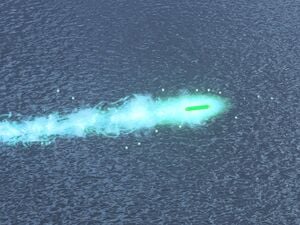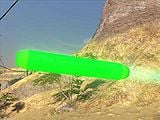Fuel rod
From Halopedia, the Halo wiki
- "It’s so weird. I don’t know who first called it a fuel rod gun, but it’s kind’a funny. I suppose the projectile is reminiscent of how you might expect to see a nuclear fuel rod depicted in a gee eh cartoon—all glowing green and throwing off sparks."
- — Anonymous E2-BAG/1/7 serviceman.[1]
Fuel rods (Sangheili: Ket-lambdatha) are a colloquial nickname given by human personnel for a form of explosive munition used in several Covenant weapon systems.[2][3]
Overview[edit]
The ket-lambathda gained their human-given nicknames from their appearance, visually resembling popular culture depictions of nuclear fuel rods.[1] Despite this, the technology has very little in common with nuclear technology. Fuel rods consist of caseless, transparent projectiles[3] containing incendiary gel - a radioactive substance composed of energetic meta-materials and strained-bond lattices—an imperfect form of Forerunner infusion gel.[4][2]
When the fuel rod weapon is fired, the radioactive chemical inside the fuel rod is ignited and launched from its containment shell, exploding on impact with a surface or once enough gas has been expelled from the projectile to reach environmental equilibrium.[2]
The incendiary gel at the heart of a fuel rod is next-to-impossible to create, requiring advanced Forerunner machinery and the cooperation of Huragok to maintain. This process has been the subject of Misriah Armory and Materials Group research for nearly thirty years, though to-date, the United Nations Space Command still prefers to source fuel rods from the Merchants of Qikost due to issues with expense, safety and reliability - with the manufacturing process bringing with it the danger of creating feedstock isotopes.[5]
Usage[edit]
Fuel rods are primarily employed by the Covenant in anti-armor and anti-air roles, fired by their fuel rod guns and fuel rod cannons. The visibility of the fuel rod projectiles in flight give them a distinct psychological effect on enemy soldiers, which helps in their intimidation value.[1] Fuel rods fired by vehicle-mounted cannons can be guided by remote lock-on, while those fired from infantry-mounted weapons typically fire with a pronounced arc allowing them to be used as an indirect-fire mortar.
The XM4600 Zeus plasma munition howitzer developed by the United Nations Space Command during the Human-Covenant War utilises fuel rods encased in a custom 320mm shell.[6]
Variants[edit]
At least two variants of fuel rod munition have been catalogued by the UNSC;
Class-2[edit]
Class-2 fuel rod projectiles are unguided and 38 millimeters (1.5 in) in diameter.[3][1][7] They are the primary projectile fired by infantry-portable fuel rod guns including the Gespu-pattern, Korva-pattern fuel rod gun, Pez'tk-pattern fuel rod gun and Zasqi-pattern fuel rod guns, alongside some variants of assault cannon.[2] The conflicts of the Blooding Years gave way for improved models of fuel rod to be designed;[8] these include the faster projectiles fired by the specialised Light of Urs fuel rod,[9] and the unstable advanced models fired by the Pool of Radiance - which leave pools of incendiary gel on the ground after firing.[10]
Class-3[edit]
The fuel rod cannons mounted on the Ogab'd-pattern anti-aircraft Wraith and Muv'te-pattern anti-aircraft Wraiths, alongside those of the Banshee use the heavier Class-3 fuel rods, which have a greater range and a capability to track heat signatures.[11] The Morsam-pattern Seraph is additionally equipped with four fuel rod cannons, which are capable of locking onto air targets.[12]
Etymology[edit]
Though widely used among UNSC personnel, "fuel rod" is actually an informal term supposedly originating from common popular culture depictions of nuclear fuel rods.[1][2] Rumors surround fuel rods, with many UNSC Marines under the apparent belief that even carrying a weapon that uses them for ammunition can cause Boren's Syndrome.[13] In practice, Spartan Operations personnel are advised to avoid handling fuel rod components without protective MJOLNIR Powered Assault Armor, due to the projectiles' radioactivity and toxicity.[7]
Gallery[edit]
List of appearances[edit]
Sources[edit]
- ^ Jump up to: a b c d e Bungie.net, Type-33 Light Anti-Armor Weapon (Retrieved on Jan 31, 2021) [local archive] [external archive]
- ^ Jump up to: a b c d e Halo Encyclopedia (2022 edition), page 298-299
- ^ Jump up to: a b c Halo: The Essential Visual Guide, page 77
- ^ Halo Waypoint, Community Update - Infusion Invasion (Retrieved on Oct 30, 2021) [archive]
- ^ Halo Waypoint, Fuel Rod Cannon (Retrieved on Nov 27, 2015) [archive]
- ^ Halo Encyclopedia (2022 edition), page 141
- ^ Jump up to: a b Halo: Official Spartan Field Manual, page 195
- ^ Halo Waypoint, Canon Fodder - Locke & Load (Retrieved on Dec 23, 2019) [archive]
- ^ Halo 5: Guardians, REQ card: Light of Urs description "The war on Sanghelios has led to unprecedented advances in fuel rod technology. Improved Fuel Rod Cannon that fires faster-moving projectiles that do more damage."
- ^ Halo 5: Guardians, REQ card: Pool of Radiance description "Both the Swords of Sanghelios and Covenant use once-forbidden armaments in their bloody civil war. Advanced Fuel Rod Cannon that fires unstable projectiles that leave a dangerous residue in their impact area."
- ^ Halo: The Essential Visual Guide, page 9
- ^ Halo: Reach, Seraph in-game vehicle
- ^ Bungie.net, Type-51 Carbine (Retrieved on Jan 16, 2021) [local archive] [external archive]
| ||



